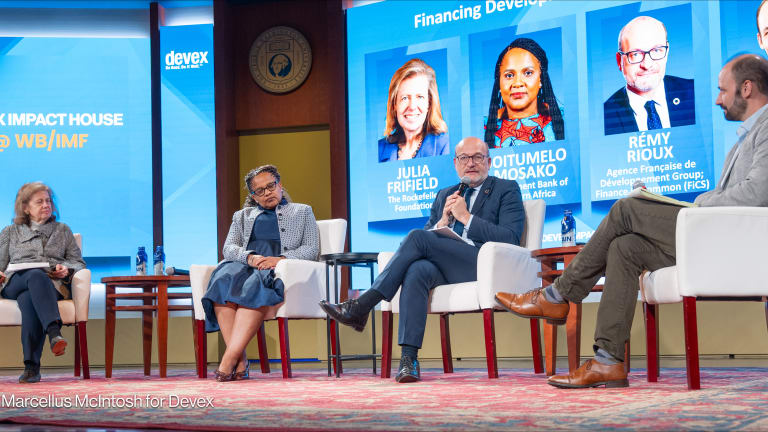
The ongoing process to craft a post-2015 global development agenda should be more transparent – otherwise, world leaders may not want to sign on, a panel of British parliamentarians worries in a report published Tuesday that also identified job creation as the most important goal for the coming years.
It’s the first time since a high-level panel tasked by U.N. Secretary-General Ban Ki-moon with crafting a followup set to the Millennium Development Goals began its work, belatedly, at the end of last year. And it foreshadows the intense debate that is sure to heat up further as the deadline for reaching those anti-poverty targets draws closer.
The U.K. lawmakers, who are part of the House of Commons’ International Development Committee, are urging Prime Minister David Cameron to use all power at his disposal to engage his peers in the process of crafting measurable targets to guide international cooperation. Cameron co-chairs the high-level panel which is now crafting an agenda to succeed the MDGs, which expire in two years. The panel is expected to share its recommendations with the United Nations later this year.
The high-level panel’s secretariat has a “core team of about seven or eight” only, plus external support – much less than similarly prestigious panels, IDC notes in a report published Tuesday, Jan. 22.
“The high-level panel’s conclusions and recommendations are therefore less likely to have secured international political ‘buy-in’ before they are published,” IDC worries.
The members of parliament urge Cameron to keep a cross-agency team of top government officials engaged as development-focused surrogates, and convince the high-level panel’s co-chairs to keep a U.N. secretariat in place until the U.N. General Assembly agrees the post-2015 development agenda.
“It is great that the prime minister has had the opportunity to co-chair such an important panel, but it is essential that he remains engaged once the panel’s work is over,” said IDC Chair Malcolm Bruce. “After the panel publishes its report, it will be at least another two years before the new goals are finally unveiled. During that time, he has a unique opportunity to get other heads of government on board, and to mobilize public opinion to support the panel’s agenda.”
The MPs are criticize the lack of information about the high-level panel’s work.
“In an age where transparency is increasingly important, publishing a note of meetings would have helped to achieve public ‘buy-in,’” they write.
The panel should set “clear proposals for an international campaign” to win support for its post-MDG agenda with the public as well as the leaders of developing and donor countries.
IDP members aren’t recommending specific goals, although they do stress the importance of job creation, sustainability, governance, gender equality, universal health care and tertiary education as well as building on the MDGs to completely eliminate extreme poverty.
They do weigh in on a debate, however, that has been raging at least since Rio+20, last July’s U.N. Conference on Sustainable Development in Brazil: Should the post-2015 agenda be global or focus on developing countries only, as the Millennium Declaration which created the MDGs did?
The U.K. parliamentarians are pushing for the former. The post-2015 agenda, they say, should set up to 10 specific and measurable goals for all countries, including traditional donors and middle-income countries, in key areas of international cooperation such as development aid, climate change, tax, trade, transparency, migration and intellectual property rights.
While the new goals should be global in scope, underlying targets and indicators should be “specific to individual countries’ circumstances,” IDP members write.
“Individual countries may, however, lack the capacity or political will to develop their own targets and indicators. Therefore, we would propose that various sets of targets and indicators be developed, and individual countries choose the set most appropriate to their circumstances,” their report states. “Whatever the final content of the next set of development goals, the prime minister must use his influence to ensure that the goals are simple and measureable.”
The high-level panel will meet next month in Monrovia, Liberia, to continue negotiations on the post-MDG agenda. Further meetings are planned for March in Indonesia and May in New York. Final recommendations are expected to be shared with the United Nations in September.
IDC plans to stay engaged with the post-2015 development process – a departure from its usual work of holding the U.K. Department for International Development to account for its past work. In the coming months, the panel plans to publish reports on violence against women and girls, as well as on DfID programs Pakistan, especially those focused on education. IDC also wants to conduct a “longer-term inquiry” into the future of U.K. development cooperation.
Read more development aid news online, and subscribe to The Development Newswire to receive top international development headlines from the world’s leading donors, news sources and opinion leaders — emailed to you FREE every business day.








